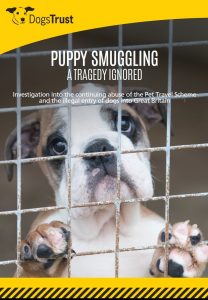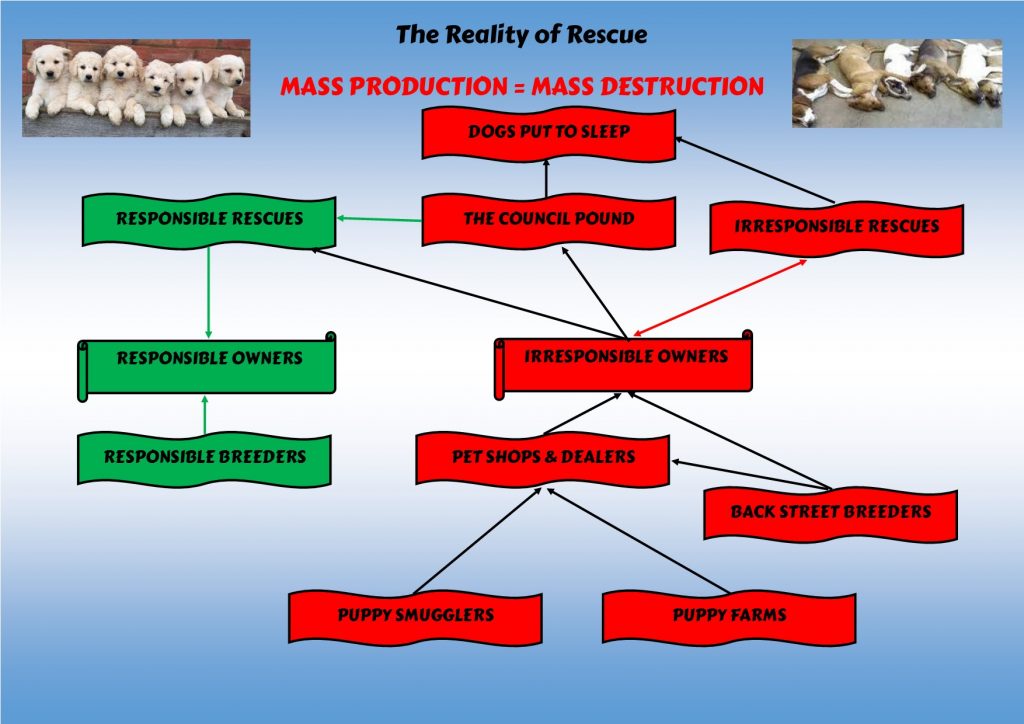Mass Production = Mass Destruction
 It is a harsh fact of life that many dogs are now becoming part of our disposable Britain; no longer are they always seen as Mans’ best friend, but often Man can be their worst enemy. Rescues are contacted on a daily basis with people wanting to rehome their dogs for a number of reasons; relationship breakdowns, moving into smaller or rented accommodation, change in working hours meaning their dog is being left for long periods of time alone, owners passing away and worst of all, cases of neglect and abandonment, both of which are on the increase. Maybe the most heart breaking reason of all is the faithful older friends that have just become too expensive because they need some veterinary help in their twilight years so are no longer wanted. Too many of these dogs end up being picked up as strays and are taken to the local council ‘pound’.
It is a harsh fact of life that many dogs are now becoming part of our disposable Britain; no longer are they always seen as Mans’ best friend, but often Man can be their worst enemy. Rescues are contacted on a daily basis with people wanting to rehome their dogs for a number of reasons; relationship breakdowns, moving into smaller or rented accommodation, change in working hours meaning their dog is being left for long periods of time alone, owners passing away and worst of all, cases of neglect and abandonment, both of which are on the increase. Maybe the most heart breaking reason of all is the faithful older friends that have just become too expensive because they need some veterinary help in their twilight years so are no longer wanted. Too many of these dogs end up being picked up as strays and are taken to the local council ‘pound’.
Rescues are fighting a daily uphill struggle to cope with the sheer number of dogs they are being asked to help, and not just from their owners. Many of the dogs we take in today, come straight from the pounds as dumping the dog is the quickest option! This means that as a rescue we do not have any history for the dogs taken into our care and have to quickly assess their medical needs and then their behaviour and temperament. The pound dogs are usually the most loving dogs as they are the ones that appreciate true care and love, however, they can come with their issues, such as aggression towards other dogs, maybe because they have had to fight for their share of food at some stage, so it is like unravelling a ball of string to understand them.
When we started in rescue the cases coming in were commonly, an owner had died or a family were having to move to rented accommodation, where dogs were not allowed, due to having lost their job and own home. The people rescuing dogs also seemed to be of a different calibre. People who applied to a rescue to adopt a dog seemed to accept the dog would not necessarily come trouble free and were prepared to work with issues and accepted there were no guarantees. Unfortunately, nowadays, too many people look to adopt a rescue dog and expect the perfect pooch. They think because they are rescuing a dog instead of buying a puppy they are doing their bit. They are, but they do not take into account how many of these dogs have been tainted by another human being and just need understanding and a helping hand to get them on the right road.
Apart from irresponsible owners, there are many reasons dog rescue has become such a challenge:
- Council cutbacks
- Outdated laws
- Back street breeders and puppy farms
- Puppy smuggling
- Dogs being brought in from other EU countries by ‘rescues’
- Internet based advertising
- Irresponsible rescues and dealers pertaining to be rescues.
Council Cutbacks
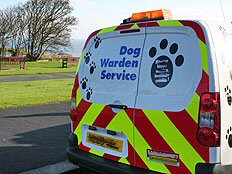 In the good old days, every council (local authority) had at least one dog warden for their area who was responsible for picking up stray and lost dogs and ‘policing’ the dog community. In 2016, with major cutbacks across all departments within our councils, some do not even have their own dedicated dog warden but sub-contract the task. Stray or lost dogs, would be taken to the council pound, very often a commercial kennel contracted for the task, where the dog would be kept for 7 days giving the owner a chance to reclaim their dog. Many of these dogs would be reclaimed by their owner and if not, the dogs would then go onto a rescue to be found a new home, or in some cases, the kennels would work on finding them a suitable home themselves.
In the good old days, every council (local authority) had at least one dog warden for their area who was responsible for picking up stray and lost dogs and ‘policing’ the dog community. In 2016, with major cutbacks across all departments within our councils, some do not even have their own dedicated dog warden but sub-contract the task. Stray or lost dogs, would be taken to the council pound, very often a commercial kennel contracted for the task, where the dog would be kept for 7 days giving the owner a chance to reclaim their dog. Many of these dogs would be reclaimed by their owner and if not, the dogs would then go onto a rescue to be found a new home, or in some cases, the kennels would work on finding them a suitable home themselves.
Move forward to 2016 and it is a very different story and one that could have been prevented with Government understanding and intervention. The dogs taken in by the pound are usually not just lost, but dumped by an irresponsible owner because the dog has an issue, is old, is ill, has been neglected, they are moving and cannot take the dog with them, they have a puppy so the older dog is no longer wanted, or simply because they cannot be bothered with a dog anymore. This is the reality faced by dogs and rescues alike across the UK every day.
The lucky dogs are those that are taken in by a rescue after their 7 days is up or land in a kennels where they will look for a suitable new home for them. The councils do not want the dogs in there any longer than they are legally obliged to keep them, as this costs money. Many of the commercial kennels used by councils as pounds are in it purely for the money and have little empathy or concern with the dogs in their care. The result, once the 7 days stay is completed, that dog is then put to sleep regardless of its age, health, temperament or behaviour.
Some of the conditions in these kennels are horrendous, with the only authority in power to monitor them being the very councils they are earning money from. Remember, these are the councils who may not even have a dog warden so who is actually monitoring them? These are the councils that are probably more interested in the cheapest rates, so why would they want to rock the boat? Another council system left open to abuse with the only sufferers being the dogs. The dogs in many pound kennels are unlikely to ever come out of their kennel during their stay let alone get any attention. Food may be cheap and minimal, and the environment is full of noisy, scared animals. This is how hundreds of dogs every week spend the last 7 days of their life up and down the country.
Dog wardens are now also referred to as animal wardens (AW) as they increasingly have to deal with a variety of different species of lost animals, not just dogs. Their normal duties and responsibilities include:
- Dealing with stray dogs
- Enforcing dog related legislation
- Promotion of responsible dog ownership
- Dog fouling
- Noise pollution caused by dogs
- Education
- Liaising and working alongside other agencies.
So not only does an AW have considerable powers of enforcement, but they should also educate the public about their role and legal responsibilities under the Animal Welfare Act as pet owners. Remember, the role of the AW is very often sub-contracted out to a company who is operating for profit, not necessarily the best interests of the dogs and the community!
Outdated Laws
The laws relating to responsible dog ownership are outdated and draconian. The only laws that have been updated substantially over recent years relate to dangerous dogs and anti-social behaviour:
- The Dangerous Dogs Act 1991 (section 3)
- The Dangerous Dogs (Amendment) Act 1997
- The Dangerous Dogs (Amendment) Act 2014
- Anti-Social Behaviour (ASB) Crime and Policing Act 2014
The initial Dangerous Dogs Act 1991 (section 3) meant it was a criminal offence to allow a dog to be ‘dangerously out of control’ in a public place, in a place where it is not permitted to be, and some other areas. The 1997 Amendment removed the mandatory destruction order provisions on banned breeds and re-opened the ‘Index of Exempted Dogs’ for dogs which the courts consider would not pose a risk to the public. The 2014 Amendment key areas of change were:
- The extension of section 3 to apply to all places including private property
- The extension of section3 to apply to assistance dogs
- Extended rights of seizure
- Increased sentencing
- Courts’ new assessment in deciding whether a dog is a danger to public safety
- Civil proceedings.
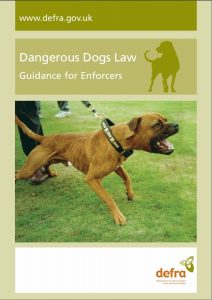 The banned breeds are the Pit Bull Terrier, the Fila Brasileiro, the Dogo Argentino and the Japanese Tosa. The Pit Bull Terrier has caused the most controversy of all. With the Breed Specific Legislation, many bull breed dogs are being deemed to be a Pit Bull ‘type’ by Dog Legislation Officers (DLO’s), who work on a list of characteristics. It comes down to the DLO’s individual interpretation meaning that many bull breeds have been deemed to be ‘type’ which many others would argue. This has led to the destruction on many healthy and well behaved animals; death by type. Even within DEFRA’s, “Dangerous Dog Laws Guidance for Enforcers”, it states, “Identification of prohibited types has always been a difficult area under the 1991 Act. This legislation gives power to any constable or authorised local authority officer to seize any dog they believe to be prohibited.” There are of course many campaigners and petitions in action trying to get this legislation amended, with the message being, “blame the deed not the breed”. With the updates in other areas of the Dangerous Dogs Act there is no need to have banned breeds, or at least, maybe ‘type’ should be based on DNA rather than opinion?
The banned breeds are the Pit Bull Terrier, the Fila Brasileiro, the Dogo Argentino and the Japanese Tosa. The Pit Bull Terrier has caused the most controversy of all. With the Breed Specific Legislation, many bull breed dogs are being deemed to be a Pit Bull ‘type’ by Dog Legislation Officers (DLO’s), who work on a list of characteristics. It comes down to the DLO’s individual interpretation meaning that many bull breeds have been deemed to be ‘type’ which many others would argue. This has led to the destruction on many healthy and well behaved animals; death by type. Even within DEFRA’s, “Dangerous Dog Laws Guidance for Enforcers”, it states, “Identification of prohibited types has always been a difficult area under the 1991 Act. This legislation gives power to any constable or authorised local authority officer to seize any dog they believe to be prohibited.” There are of course many campaigners and petitions in action trying to get this legislation amended, with the message being, “blame the deed not the breed”. With the updates in other areas of the Dangerous Dogs Act there is no need to have banned breeds, or at least, maybe ‘type’ should be based on DNA rather than opinion?
The ASB Act was designed to give the police, councils and certain others designated, the power to tackle irresponsible dog owners such as, an owner failing to control a dog and causing a nuisance to others/other animals, when dogs are used to intimidate people, failing to pick up after your dog, not having your dog on a lead and restrictions to the number of dogs one person can walk.
If some areas of dog law can be changed then there is no excuse as to why other important areas of dog law cannot be updated and better defined.
New Battersea research provides damning verdict on the Dangerous Dogs Act, 25 years on.
Battersea have called on the Government to review the 1991 Dangerous Dogs Act in light of new research released.
Our new report, “What’s Breed Got To Do With It?”, marks the 25th anniversary of the introduction of the 1991 Act, which outlawed four breeds of dogs from the UK; the Pit Bull Terrier, the Dogo Argentino, the Japanese Tosa and the Fila Braziliero.
Battersea and many other animal welfare organisations have long opposed Section 1 of the 1991 Act that judges a dog on its looks not its behaviour, and can see them destroyed if deemed by the Police to be a banned breed. There is also little evidence that the Act has reduced dog attacks or been successful in eradicating the Pit Bull Terrier in the UK.
Last year Battersea took in 91 Pit Bull Terrier types, confirming the breeding and sale of these animals is still going on and has simply been pushed underground.
What’s Breed Got To Do With It? Report 2016
The Control of Dogs Order 1992
This mandates that any dog in a public place must wear a collar with the name and address of the owner engraved or written on it, or engraved on a tag. Telephone number is optional but advisable. At the time of writing the fine for not complying is £5000. In this day and age surely a telephone number should also be mandatory and in reality, the number of people fined under this order is so minimal it is unknown.
The Microchipping of Dogs (England) Regulations 2015
From 6th April 2016 all dogs in England, Scotland and Wales are legally required to be microchipped and their details registered on one of the authorised databases. The idea behind this move, which has been campaigned for by numerous animal pressure groups working collectively as the Microchipping Alliance, a group which includes the British Veterinary Association, the Kennel Club, the Dogs Trust and the RSPCA, is to encourage all dog owners to take responsibility for keeping their pet.
Under the law you are obliged to keep your details up to date on the database. Police and AW’s are issued with microchip reader scanners so that instant enforcement of the law can be carried out. A time window will be allowed for the owner to get the dog microchipped or details updated if not done, after which a £500 fine for failing to comply will be issued. Remember the fine for not having an identity tag on your dog, which can be lost or removed, is £5000, and yet the fine for a permanent identity method is only £500!
If you sell or pass your dog on, you as the previous keeper are required to register the new keeper. A microchip is not proof of ownership but operates on the same basis of a log book for a car. Similarly, if your dog dies, you must inform the database that holds your dog’s details. All puppies must be microchipped by 8 weeks of age. One of the intentions of the legislation is that dogs coming from puppy farms and other unregulated dog breeders will also be traceable under the law.
Of course the responsible owners have microchipped their dogs already in order that they can be easily reunited in the event of their dog being lost, however, those people who very clearly are not responsible enough to have the care of a living creature in their hands for one reason or another, be it neglect, abandonment or abuse, will continue to flout the law. So who is going to ‘police’ these breeders, from casual breeding of dogs as an ‘easy earner’, from breeding puppies in unsuitable conditions in order to earn a few pounds selling them down the pub, to full scale puppy farming businesses? The same people who have been sub-contracted to act as AW’s? The police have suffered their own cutbacks so will not be looking to routinely check dogs for a microchip unless that dog is involved in an incident or accident.
Dogs are stolen quite frequently for breeding or to be used as bait dogs in dog fighting, and it is hoped that microchipping will help in ownership disputes and quicken the process of reuniting those dogs with their real owners. With microchipping, keepers and their dogs will have an official relationship, rather as they did under the old dog licence. Additionally, the modern technology of microchipping will not only help lost dogs be re-united with their families, it is hoped that it will also connect liable human beings to abused animals. Mistreatment of animals will still happen even if dogs are microchipped, but now it is hoped that there will be some redress against the perpetrator on behalf of society and, more importantly, on behalf of the dog. The reality, the people who already neglect and mistreat their animals and who let them run wild will simply side step the law deliberately!
Even if everyone got their dogs microchipped, microchipping is only as efficient as the people who monitor it. Shockingly the National Dog Warden Association advises that around 40% of dogs it deals with that are already microchipped have missing or inaccurate information. So this is not a cure all, and it will not be perfect, but is merely a small step in the right direction in encouraging all of us as a society to care for our dogs correctly and responsibly.
Animal Welfare Act 2006
With regards to dogs, this Act tackles acts of cruelty, neglect, mutilation, tail docking, animal fighting and the giving of pets as prizes. In addition to this, it introduces a duty of care for all pet owners to provide for their animals under Section 9:
- a suitable environment,
- a suitable diet,
- the ability to exhibit normal behaviour patterns,
- protection from pain, suffering, injury and disease,
- consideration of the animal’s needs to be housed with, or apart from, other animals.
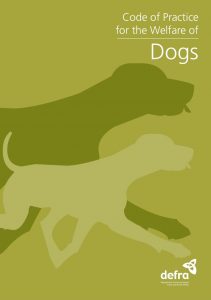 The existing animal welfare legislation and governance structures are not fit for the purpose of protecting animals or reflecting public concern about animal welfare. Whilst the Act is perceived to have had a positive impact on the welfare of some companion animals, its benefits for the vast majority of kept animals in the UK, have been minimal. The impact of the legislation is highly inconsistent. DEFRA produced, “Code of Practice for the Welfare of Dogs”, stating that the Code;
The existing animal welfare legislation and governance structures are not fit for the purpose of protecting animals or reflecting public concern about animal welfare. Whilst the Act is perceived to have had a positive impact on the welfare of some companion animals, its benefits for the vast majority of kept animals in the UK, have been minimal. The impact of the legislation is highly inconsistent. DEFRA produced, “Code of Practice for the Welfare of Dogs”, stating that the Code;
“is to provide practical guidance to help you to comply with the provisions of Section 9 of the Animal Welfare Act 2006 (the Act). It does not tell you precisely how to care for a dog, but summarises important things you should consider when making decisions about how best to care for your dog. Breach of a provision of this Code is not an offence in itself but, if proceedings are brought against you for an offence under Section 9 of the Act, the Court will look at whether or not you have complied with the Code in deciding whether you have committed an offence.”
An offence is committed if a person fails to take reasonable steps to ensure that the needs of an animal for which they are responsible are met. Section 10 of the Animal Welfare Act 2006 allows AW’s or the RSPCA to serve an Improvement Notice on a person who it is believed is failing to observe best practice in caring for an animal. If conditions improve prosecution can usually be avoided. Councils will try to avoid prosecutions due to the costs involved as not only will there be legal cost implications, but in many cases the animals must be seized and have to be kept under the care of the council until the case is heard and a judgement made. Some councils will pass such matters onto the RSPCA who are more likely to instigate a prosecution.
The maximum sentence is 6 months imprisonment and/or a £5,000 fine. The court also has the power to order a defendant to be deprived of the animal and can disqualify them from keeping animals in the future. In reality, it is very rare to see harsh sentences and/or fines handed out, so the deterrent is not strong enough to have the desired effect. The other major factor is that many people feel that not enough is done by the authorities when a dog is reported as being neglected or abused. Whilst DEFRA’s Code of Practice may be the bench mark for owner’s and courts, it does not seem to be taken into account strongly enough by the front line officials dealing with the cases as the actual Act only states the actual 5 points above with no expansion or definition. It seems that as long as a dog has shelter, food and water and is medically sound, this is enough to suffice many inspections. Little or not enough consideration is taken on, “the ability to exhibit normal behaviour patterns”. The Code of Practice states:
“The way a healthy dog behaves is individual and depends on its age, breed or type and past experience. However, most dogs are playful, sociable animals and they enjoy playing together with toys, people and other dogs. Play is an important part of getting along with people and other dogs, and although dogs will spend some time playing alone with toys etc., they should have regular opportunities for interactive playing. Dogs are intelligent animals and can suffer from boredom. If your dog is bored, and does not have enough to do, it may suffer or engage in inappropriate behaviour. Changes in behaviour may indicate that something is wrong with a dog’s health.
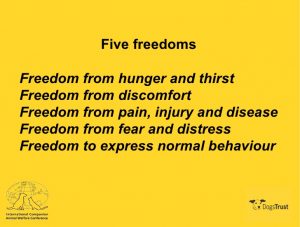 All dogs, in particular puppies, need rest. However, individual dogs have different needs and some will sleep for long periods after exercise or food; others will need less rest and will be more active. A dog needs regular exercise and regular opportunities to walk and run. The amount of exercise a dog needs varies with age, breed and health. Some breeds of dog need a lot of exercise and you should take account of this when choosing a dog. Young dogs may need to have their exercise restricted during periods of rapid growth, to avoid developmental problems. Exercising dogs in extremes of weather can lead to suffering.
All dogs, in particular puppies, need rest. However, individual dogs have different needs and some will sleep for long periods after exercise or food; others will need less rest and will be more active. A dog needs regular exercise and regular opportunities to walk and run. The amount of exercise a dog needs varies with age, breed and health. Some breeds of dog need a lot of exercise and you should take account of this when choosing a dog. Young dogs may need to have their exercise restricted during periods of rapid growth, to avoid developmental problems. Exercising dogs in extremes of weather can lead to suffering.
Training a dog is important to help it learn to behave appropriately and to make it easier to keep under control. Puppies need to get used to the many noises, objects and activities in their environment, some of which are frightening when first experienced. Good training can enhance a dog’s quality of life, but punishing a dog can cause it pain and suffering.”
Too many dogs are left in undesirable situations because of the lack of definition in the Act, the lack of enforcement of the Act, the lack of penalty and the lack of funding available to councils. With some simple changes to the Animal Welfare Act, by definition and incorporation of the Code of Practice for the Welfare of Dogs, much more could and should be done to improve the quality of life for many dogs out there. There is also the controversy of a charity, the RSPCA, having such rights of power to prosecute, especially with the recent criticism that they had wasted millions of charitable funds prosecuting cases that had no substance with regards to hunting with horses and dogs.
Breeding and Sale of Dogs (Welfare) Act 1999
Breeders who breed five or more litters per year must be licensed by their local authority. Breeders with fewer litters must also be licensed if they are carrying out a business of breeding dogs for sale. Licensed breeders must:
- not mate a bitch less than twelve months old
- not whelp more than six litters from a bitch
- not whelp two litters within a twelve month period from the same bitch
- keep accurate records
- not sell a puppy until it is at least eight weeks of age, other than to the keeper of a licensed pet shop or a Scottish rearing establishment
 Existing fragmented legislation covering the commercial breeding and sale of dogs places no obligation on breeders or vendors to ensure that puppies are bred, reared and sold responsibly, so that they meet consumer expectations and are fit for purpose as family pets.
Existing fragmented legislation covering the commercial breeding and sale of dogs places no obligation on breeders or vendors to ensure that puppies are bred, reared and sold responsibly, so that they meet consumer expectations and are fit for purpose as family pets.
The Act relies on breeders and vendors applying to the council to obtain the necessary licence with no systems in place to monitor the sale of litters within the area ensuring compliance. Again, we are relying on the AW’s to ‘police’ breeders and vendors, carry out inspections and ensure license requirements are kept up to scratch.
There are two major problems with this Act. There is no regulation for the breeder who breeds their bitches or males once or twice a year purely for financial gain, the hobby or back street breeder. Many of these breeders have no regard for the health or the temperament of the dog they are breeding from, lack knowledge on what a litter needs both medically and habitually, and advertise on internet classified sites as they would if selling a car. These puppies are sold for cash with no consideration as to the capability of the new owners, no paperwork and no comeback! The majority of this type of breeder is on benefits and is literally using their ‘pet’ as a cash cow to supplement their income, which of course is not declared!
The other major problem is that the Act is supposed to be a safeguard for the welfare of the parents and puppies in not only a small breeder environment, but through to the large scale breeding kennel operations that exist throughout the country, predominantly in Wales. These types of establishment are run on such a commercial scale, puppy farms, that there needs to be more definition and expansion of the requirements relating to the dogs’ environment and welfare needs.
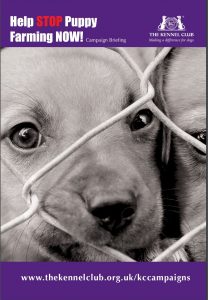 Again, the Act is out of date and not fit for purpose in the current economic climate of mass production of puppies. Commercial boarding kennels must adhere to the Animal Boarding Establishments Act 1963, applying to their council for a license having satisfied all necessary requirements. Why are commercial breeding kennels not subject to such licensing conditions before they are allowed to start breeding?
Again, the Act is out of date and not fit for purpose in the current economic climate of mass production of puppies. Commercial boarding kennels must adhere to the Animal Boarding Establishments Act 1963, applying to their council for a license having satisfied all necessary requirements. Why are commercial breeding kennels not subject to such licensing conditions before they are allowed to start breeding?
There are many organisations endeavouring to raise awareness of bad breeding practice including the Kennel Club who state, “The Breeding of Dogs Act 1973 (as amended by the Breeding and Sale of Dogs (Welfare) Act 1999) licences breeding establishments and the sale of dogs. This legislation set out a regime for local authorities to license and inspect dog breeding establishments within their jurisdiction which should have gone some way to tackle puppy farming.
However, problems with enforcement have meant that it has not curbed the activity of puppy farmers as local authorities lack the resources and expertise to properly address poor breeding practices and current guidance on selling puppies in pet shops is unclear.
As current legislation has not had the intended effect of curbing puppy farming, due to the lack of proper enforcement, it is important that both the Kennel Club and Government take steps to ensure good breeding practices are adhered to. “
Help Stop Puppy Farming Now – Kennel Club Brief
The Pet Animals Act 1951
 Where a person carries on at any premises, including a private dwelling, a business of selling animals as pets, and the keeping of animals in any such premises with a view to their being sold in the course of such a business, whether by the keeper or any other person, under the Pet Animals Act 1951, the person is regarded as being the keeper of a pet shop and is required to obtain from his local authority a licence. Exceptions apply where a person only keeps or sells pedigree animals bred by him or the offspring of his pets. In addition, a local authority may direct that a particular breeder, who merely sells as pets, animals which he acquired for show or breeding purposes but were found not to be suitable or needed for such purposes, is not deemed to keep a pet shop.
Where a person carries on at any premises, including a private dwelling, a business of selling animals as pets, and the keeping of animals in any such premises with a view to their being sold in the course of such a business, whether by the keeper or any other person, under the Pet Animals Act 1951, the person is regarded as being the keeper of a pet shop and is required to obtain from his local authority a licence. Exceptions apply where a person only keeps or sells pedigree animals bred by him or the offspring of his pets. In addition, a local authority may direct that a particular breeder, who merely sells as pets, animals which he acquired for show or breeding purposes but were found not to be suitable or needed for such purposes, is not deemed to keep a pet shop.
The processes of the third party puppy trade mean there is a very high risk of heath and behavioural problems in puppies sold via licensed pet shops. The production of pet dogs is wholly unique and not comparable to any other ‘livestock’ breeding enterprise. Appropriate socialisation and habituation is crucial for companion animals and dogs have particular requirements that necessitate a considerable degree of involvement from the breeder.
The sale of puppies through licensed pet shops leads to low budget, intensive breeding practices and a dereliction of responsibility for problems that may arise. The limited scope of the Pet Animals Act 1951 and a consistent pet shop outlet for cheap, mass produced puppies perpetuate serious welfare issues at many breeding establishments, including those that are licensed. Traders that adhere to their licence conditions cannot be prosecuted on the grounds of poor welfare. There are unique aspects to the sale of pet animals that are not adequately covered by generic consumer protection legislation.
Every major independent organisation concerned with animal welfare has expressed the view that dogs are not a retail commodity and recommended that puppies should only be purchased direct from a responsible breeder. When the DEFRA introduced the Animal Welfare Act 2006 it hailed it as the most significant piece of legislation in the field for 100 years. It paved the way for more detailed secondary legislation to be brought in to address specific issues. One of the areas it intended to address in this way within 5 years, at least in England, was the sale of pet animals, by replacing the outdated Pet Animals Act 1951. Even if the British Parliament lacks the courage to bring in an outright ban on third party businesses selling puppies in England, it already has the powers to radically overhaul the existing legislation.
Licensed Third Party Puppy Vending In Great Britain
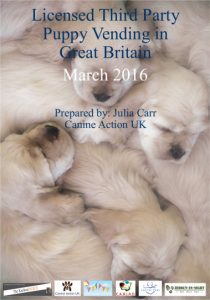 “In November 2015, Canine Action UK issued Freedom of Information requests to all 379 Local Authorities in England, Wales and Scotland, asking for information relating to pet shops that were licensed to sell puppies. Following a thorough analysis of the Freedom of Information responses, our coalition produced a comprehensive report.
“In November 2015, Canine Action UK issued Freedom of Information requests to all 379 Local Authorities in England, Wales and Scotland, asking for information relating to pet shops that were licensed to sell puppies. Following a thorough analysis of the Freedom of Information responses, our coalition produced a comprehensive report.
Our coalition of organisations campaign for higher standards of welfare for breeding dogs in general, and in particular, for the prohibition of puppy sales via licensed third party outlets (pet shops). This is the simplest and most effective means of ensuring transparency, accountability and thus responsibility for commercial dog breeders. To this end we function as campaigners, researchers and investigators and in these roles have amassed extensive knowledge and evidence of licensed breeding and pet shop establishments.
Licensing is regarded as a tool to protect animal welfare and consumers by ensuring that basic minimum standards are complied with. However, our study has shown that it is ineffective on both counts. The regulation itself is inadequate; it also has tremendous variation in application and enforcement. There is almost no deterrent for non-compliance and once granted, a licence may even serve to protect the licensee. We do not believe that the licensing system as it currently functions is fit for purpose. Rather than amending the basic parameters, a radical rethink of the entire process is required towards a system which incentivises the highest standards and will ensure that puppies are bred and reared to meet the expectations of those purchasing them.”
Licensed Third Party Puppy Vending In Great Britain Report March 2016
Back Street Breeders and Puppy Farms
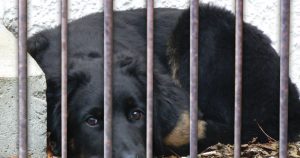 We have already mentioned the back street breeders who breed dogs purely for financial gain with little regard for the dogs’ welfare. Their breeding animals are used as cash cows to supplement their benefit income. They have no regard for licences, they have no regard for microchipping, they have no regard for animal welfare. Back street breeders purely operate for cash in hand. It is shocking the number of council tenants who are breeding their dogs on such a scale and getting away with it because there are no checks or monitors in place. When the dogs are too old to breed from, most will either find their way into a rescue or be dumped and end up in a pound to do their 7 days.
We have already mentioned the back street breeders who breed dogs purely for financial gain with little regard for the dogs’ welfare. Their breeding animals are used as cash cows to supplement their benefit income. They have no regard for licences, they have no regard for microchipping, they have no regard for animal welfare. Back street breeders purely operate for cash in hand. It is shocking the number of council tenants who are breeding their dogs on such a scale and getting away with it because there are no checks or monitors in place. When the dogs are too old to breed from, most will either find their way into a rescue or be dumped and end up in a pound to do their 7 days.
Puppy farms are basically commercial breeders. They may be licensed or unlicensed, but with the lack of monitoring of licensed establishments, there may be little difference in the standards and practices of poor management. Their aim is purely to produce puppies in mass quantities as cheaply as possible with no regard to the dogs’ welfare. The commercial breeders will sell to third parties such as pet shops and dealers. These ‘dealers’ will advertise on internet classified sites implicating the puppies have been bred by them in the home.
Puppies from these sources are usually badly bred with little regard to the parentage, and with lack of medical care they can be very poorly and it is said that 20% will die within weeks of being in their new home. This is why there are such large campaigns are at large emphasising the checks people should make when buying a puppy:
- You should always see the puppies with their mother – however the dealers have become wise to this so will use a bitch of the same breed as a stand in mum!
- It is illegal to sell a puppy under the age of 8 weeks – dealers will just lie and sell you a 6 week old puppy as the sooner they are moved on, the sooner the next lot can come through the door!
- Always check the puppy has vaccination papers – dealers forge these with little trouble!
- Check the puppy is healthy, active, clean eyes and nose, and of a good weight – do not feel sorry for the puppy and buy it to save it – report the seller!
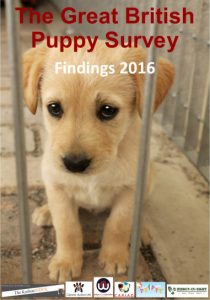 Pup Aid launched an e-petition to help ban the cruel practice of puppy and kitten farming in the UK. Founded in 2010 by TV vet Marc Abraham, they have received huge support from a nation of animal lovers including celebrities Ricky Gervais, Liam Gallagher, Brian May, Joanna Page, Meg Mathews, and Sarah Harding to name a few.
Pup Aid launched an e-petition to help ban the cruel practice of puppy and kitten farming in the UK. Founded in 2010 by TV vet Marc Abraham, they have received huge support from a nation of animal lovers including celebrities Ricky Gervais, Liam Gallagher, Brian May, Joanna Page, Meg Mathews, and Sarah Harding to name a few.
“Puppy farming is the mass commercial production of puppies purely for profit and without a thought for the welfare or happiness of the pup, breeding bitch or stud dogs. On a puppy farm breeding dogs and pups are usually kept in horrific dark conditions, totally unsocialised & riddled with both infectious and inbred, often incurable diseases. These poorly pups are then sold en masse to pet shops, online or from free newspaper ads, and usually die soon after reaching their new home.”
A coalition of anti-puppy farm campaigners conducted an extensive survey in 2015 on British puppy buying behaviours and the findings were launched earlier this year at Westminster.
Vet Marc Abraham’s Pupaid, C.A.R.I.A.D., Julia Carr’s Canine Action UK, Hidden-in-Sight, and Philippa Robinson’s The Karlton Index form the coalition together with the charity Nature Watch Foundation.
The survey asked people who had bought a puppy in the last five years for their views and information on their puppy buying experiences. An astonishing 4303 people submitted answers with over 3600 completing every question
The key findings of the survey are:
- One in six buyers did NOT see their puppy with its mother.
- One in five said they experienced either a welfare or a health issue shortly after getting their pup home.
- 80% said they had owned dogs before.
- 45% found their puppy through one of the online classified sites.
- Just over 80% said they bought directly from the breeder.
- 17% said they did not go to visit their puppy before buying it.
- 70% of the respondents had chosen a pedigree puppy.
- Fewer than half of the respondents said they were asked to sign a contract.
- 77% paid cash for their puppy, making this an economy bucking the trend for electronic payments.
The Great British Puppy Survey Findings 2016
P.U.P.S. Campaign – Awareness of the Dark Side of the Puppy Industry
By Vanessa Amoroso, IFAW Campaigns Offficer, 15th July 2016.
“One of the main issues facing the puppy trade is ‘profit over welfare’ commercial puppy farms. Many are licenced by their local council (though this is far from a guarantee on standards), some are illegal and some are based in Eastern Europe where there are fewer regulations. What these puppy farms do is breed puppies for a middle man to then sell them on, in our case right here in the UK. This separates puppies, often underage, from their mothers and may involve travelling huge distances across the UK or Europe.
Licencing and welfare is regulated in the UK by Defra (The Department for Environment, Food and Rural Affairs), and Defra’s own recommendations state that you should only purchase a pup with its mother present. Yet, the same department allows for the licencing of pet stores and puppy farms whose whole business model completely revolves around not doing this!
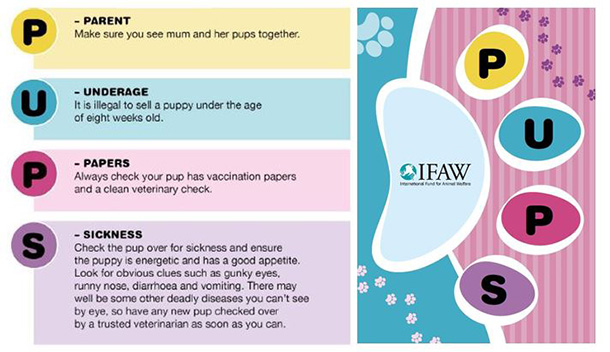 Right now, it is all too common that puppies are sold without their mothers present in pet shops and online, but simply changing the law to make third-party sales illegal (so you can’t sell a puppy without its mother) would solve this, and this would instantly stop the bulk of demand from these large, low-welfare, breeding establishments.
Right now, it is all too common that puppies are sold without their mothers present in pet shops and online, but simply changing the law to make third-party sales illegal (so you can’t sell a puppy without its mother) would solve this, and this would instantly stop the bulk of demand from these large, low-welfare, breeding establishments.
We love puppies, and we know that they are very cute indeed! That’s why we understand how hard it is trying not to fall in love with a puppy when going to see one,even if you think the conditions are questionable or even when something doesn’t feel right about the seller or the puppy.
So, IFAW’s new P.U.P.S campaign aims to drive awareness of the ‘dark side’ of the puppy industry and to ensure that the dog loving public, just like you and me, doesn’t accidentally support the cruel puppy farm trade. The message is simple – just remember P.U.P.S when you are buying a puppy.
Try to make sure you follow your head, and not just your heart, when looking for a new puppy. Naturally, as an animal welfare charity, we would always recommend that people adopt from a reputable animal rescue centre rather than buy from a breeder, but we also understand that there will always be a demand for bred puppies. It is so easy to be an unwitting part of this illegal trade, but it is also so easy to not be. Just think P.U.P.S.!
Too many puppies are suffering to satisfy the British public’s demand for fashionable breeds at low prices, and the remedy lies within. If everyone buying a puppy takes the time to research and ask just a few simple questions, and commits to not accepting excuses or vague answers, this means that there will be no market for these puppy farm pups.”
Many of these campaigns have good intentions and are a sound starting board, however the puppy farmers and dealers alike, just find new ways to get around the system. Because there is no monitoring of these farms and dealers, they are pocketing millions of pounds of cash every year at the expense of the dogs’ welfare, disappointed and upset owners, and ultimately placing a higher burden on rescues and the tax payer when the dogs are dumped.
Puppy Smuggling
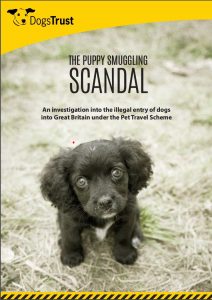 Dogs Trust carried out an in-depth six month investigation into the trafficking of puppies from Eastern Europe into the UK. The investigation focused on the puppies travelling into the UK under the non-commercial Pet Travel Scheme [PETS]. The numbers of animals coming in under PETS from Eastern Europe has increased rapidly since 2012 when changes to the legislation made it easier for people to enter the UK with puppies. According to DEFRA the number of dogs entering Great Britain via PETS rose by 61% in the first year when controls were relaxed. Just 2.5% of pets were found to be non-compliant with PETS in 2012. This does not account for any of the non-declared smuggled dogs. The investigation showed the ease with which dealers, especially those in Eastern Europe, can evade or fool customs officials since the introduction of PETS, as these figures from DEFRA suggest:
Dogs Trust carried out an in-depth six month investigation into the trafficking of puppies from Eastern Europe into the UK. The investigation focused on the puppies travelling into the UK under the non-commercial Pet Travel Scheme [PETS]. The numbers of animals coming in under PETS from Eastern Europe has increased rapidly since 2012 when changes to the legislation made it easier for people to enter the UK with puppies. According to DEFRA the number of dogs entering Great Britain via PETS rose by 61% in the first year when controls were relaxed. Just 2.5% of pets were found to be non-compliant with PETS in 2012. This does not account for any of the non-declared smuggled dogs. The investigation showed the ease with which dealers, especially those in Eastern Europe, can evade or fool customs officials since the introduction of PETS, as these figures from DEFRA suggest:
Between 2011 and 2013 the number of dogs entering the UK from Lithuania has increased by 780%; in Hungary a 663% increase in dogs travelling under PETS into the UK was recorded. Worryingly, this increase only accounts for dogs that are declared; it does not account for the number of dogs that are smuggled into the UK.
The impact of these changes and the increased volume of puppies entering the UK illegally have worrying implications for both the puppies’ welfare and for the control of rabies and the tapeworm Echinococcus multilocularis UK, as many puppies are imported from countries that are classified as having rabies. DEFRA admitted in March 2013 that something needed to be done, yet it will have taken 21 months for any changes to the PETS to be introduced and Dogs Trust believes the proposals are nowhere near sufficient to tackle this growing problem.
The investigation also reveals how the PETS scheme is being used as a cover by commercial dealers from Hungary and Lithuania on a regular basis to illegally import puppies into the UK. These dealers were aided and abetted by unscrupulous vets in Eastern Europe, who, in collusion with the dealers, are prepared to issue pet passports with falsified data. Passports are issued by vets for
puppies they have not seen; the age of puppies are changed to evade contravening PETS; dogs banned under the Dangerous Dogs Act are being brought into the country; and false vaccination stamps are added indicating rabies vaccinations had been given to puppies when they had not actually been administered. Unlike rabies, there are no initiatives to control Echinonoccus multilocularis in countries where it is endemic. Dogs Trust wonders whether an individual that is prepared to falsify rabies vaccinations would bother with tapeworm treatment or measures to prevent other diseases?
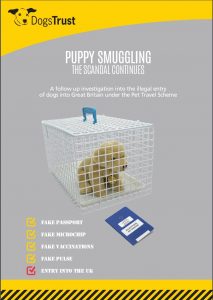 Dogs Trust’s evidence also reveals the ineffective controls at UK border ports which allows this illegal, commercial trade of puppies to enter the UK almost unhindered. This is especially so during the weekends when there are no APHA or Trading Standards personnel on physical duty at the main ports of entry such as Dover and the Eurotunnel. Trading Standards personnel are not available to assist out of hours. Wise to this knowledge, many dealers they made contact with travel with puppies over the weekend. Transporters are rarely stopped, and if they are caught travelling with incorrect paperwork there is no penalty. They are simply made to return to where they came from. The likelihood of their paperwork being questioned is low and a search of their vehicle extremely unlikely. This means they can declare up to five puppies whose paperwork may get checked (five being the number allowed under PETS), then have a further undisclosed number of puppies hidden in their vehicle which will escape any scrutiny.
Dogs Trust’s evidence also reveals the ineffective controls at UK border ports which allows this illegal, commercial trade of puppies to enter the UK almost unhindered. This is especially so during the weekends when there are no APHA or Trading Standards personnel on physical duty at the main ports of entry such as Dover and the Eurotunnel. Trading Standards personnel are not available to assist out of hours. Wise to this knowledge, many dealers they made contact with travel with puppies over the weekend. Transporters are rarely stopped, and if they are caught travelling with incorrect paperwork there is no penalty. They are simply made to return to where they came from. The likelihood of their paperwork being questioned is low and a search of their vehicle extremely unlikely. This means they can declare up to five puppies whose paperwork may get checked (five being the number allowed under PETS), then have a further undisclosed number of puppies hidden in their vehicle which will escape any scrutiny.
The Puppy Smuggling Scandal Report 2014
Puppy Smuggling The Scandal Continues Report 2015
Puppy Smuggling – A Tragedy Ignored 2017
Dogs Being Brought in from Other EU Countries by ‘Rescues’
It is a known fact that there are countries within the EU that treat their dogs diabolically when dealing with strays. Whilst we all appreciate that high numbers of dogs roaming the streets of any country is undesirable, it is not acceptable that some countries will round these dogs up and kill them inhumanely. This news sent a rush of ‘rescues’ to start importing dogs from countries such as Romania to the UK with little thought for the long term.
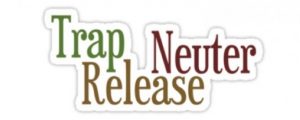 Greece is another example of a country that suffered high rates of stray dogs, but with the intervention of rescues on the ground in Greece, trap, neuter and release schemes were operated which has drastically reduced the numbers. There was not a need or a rush to just move the problem dogs from Greece to another country.
Greece is another example of a country that suffered high rates of stray dogs, but with the intervention of rescues on the ground in Greece, trap, neuter and release schemes were operated which has drastically reduced the numbers. There was not a need or a rush to just move the problem dogs from Greece to another country.
Whilst there are some legitimate rescues who operate within the law moving the dogs from countries such as Romania, many are just dealers operating for money under the umbrella of ‘rescue’. The same problems are encountered as with puppy smuggling; dogs are being brought in under PETS into the UK when the majority are most obviously commercial movements. Again, paperwork can be falsified meaning the spread of disease and unfortunately at present there is no complete EU database to track a dog’s microchip if it comes in from abroad.
Many of the Romanian dogs are street dogs and as such have never experienced a home or close contact with people. These dogs have been in vans for long and uncomfortable journeys and usually arrive terrified. People feel they are doing something special by taking on one of these dogs but are not prepared for the many issues that come with them. So where do these dogs end up when their UK owners cannot cope? Either in a UK rescue that is already full to bursting or dumped as a stray. With no ability to track back the microchip the AW’s and rescues have no way of tracking down the people who actually imported the dog for them to take responsibility.
Some of the dogs from countries such as Romania can turn out to be super pets, but they are in the minority. Whilst we agree that every animal deserves a chance and a right to the five freedoms wherever it comes from, the argument must be that as long as there are hundreds of dogs being put down as unwanted every week across the UK, how can we justify importing additional dogs to add to the problem? In addition, those people that have taken in a dog from abroad potentially could have been a home for a UK dog. Either way they would be saving the life of a dog. Rescue must start in the country of origin.
EU Dog & Cat Alliance Finalises Position on International Rehoming of Dogs & Cats
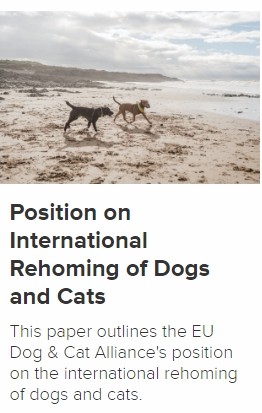 International rehoming of dogs and cats should not be carried out as a standard practice EU Dog & Cat Alliance member organisations have agreed this week. Instead members will work preventatively in the country of origin to minimise the need for rehoming animals abroad, for example through neutering and educational campaigns.
International rehoming of dogs and cats should not be carried out as a standard practice EU Dog & Cat Alliance member organisations have agreed this week. Instead members will work preventatively in the country of origin to minimise the need for rehoming animals abroad, for example through neutering and educational campaigns.
Simona Lipstaite, European Policy Advisor for the EU Dog & Cat Alliance, comments:
“International rehoming of dogs and cats is a practice which is not sustainable in the long term as it only provides interim measures rather than addressing the root causes of companion animals living in shelters or being homeless in the country of origin. It also presents the risk of spreading diseases across borders and introducing new diseases into different countries. The main diseases under consideration are rabies,Echinococcus multilocularis, leishmaniosis, babesiosis, dirofilaria and ehrlichiosis and, in the case of cats, retroviruses.”
International rehoming presents further issues in relation to cats. Being much more territorial than dogs, cats inevitably suffer a huge amount of stress during transport. Cats take a long time to acclimatise to a new environment and some may never recover from the stress of being moved internationally.
Where international rehoming is unavoidable, members have agreed that there must be full traceability and that the rehoming is solely in the best interests of the animal, and not for monetary gain for the organisation. Member organisations must also do it legally and following proper disease testing procedures.
Position On International Rehoming Report 2016
The Welfare of Dogs and Cats Involved in Commercial Practices Report
Think of it another way, the continued debate of migrants coming into the UK to abuse our benefit system V the migrant coming into the UK and contributing. We have all heard the arguments, especially around BREXIT, including the extra pressure on services such as the NHS. Whilst people migrate to the UK we are not killing UK nationals at the same time. What is happening however, is that we are bringing ‘migrant’ dogs into the UK while we are killing UK dogs at the pounds. This is hypocrisy at the highest level!
Internet Based Advertising
 The Pet Advertising Advisory Group (PAAG) was created in 2001 to combat the growing concern amongst animal welfare organisations regarding the irresponsible advertising of pets for sale, rehoming, or exchange. In certain cases, such ads were illegally offering dogs banned under the Dangerous Dogs Act, endangered animals, or advertising establishments which were not fit for the breeding or boarding of animals. There was also concern that readers of newspapers and magazines which carried pet advertising, were not even given some of the basic principles surrounding the selection and purchase of a pet.
The Pet Advertising Advisory Group (PAAG) was created in 2001 to combat the growing concern amongst animal welfare organisations regarding the irresponsible advertising of pets for sale, rehoming, or exchange. In certain cases, such ads were illegally offering dogs banned under the Dangerous Dogs Act, endangered animals, or advertising establishments which were not fit for the breeding or boarding of animals. There was also concern that readers of newspapers and magazines which carried pet advertising, were not even given some of the basic principles surrounding the selection and purchase of a pet.
Since its formation, PAAG has witnessed a massive increase in the number of pets and animals sold online. The ease and popularity of the internet means that the impulse buying of pets has become an appealing option, with people able to purchase an animal at the click of a button. The lure of a quick sale also attracts many unscrupulous breeders and dealers to websites. As a group PAAG became concerned over the number of inappropriate and illegal adverts they were seeing on these types of sites, so decided to draw up a set of minimum standards for these websites to adhere to with regards to selling pets.
PAAG aims to ensure that pet animals advertised for sale are done so legally and ethically. PAAG has been engaging with online marketplaces in the UK to help them distinguish appropriate adverts from those that should be removed. They have developed a set of Government backed minimum standards which several of the UK’s largest classified websites have agreed to meet. This continuing work with websites is vital, especially given the current lack of regulation with regards to the online sales of pets.
 PAAG also aims to raise public awareness of the need to act responsibly when buying pets from websites and publications and the need to do research before making any purchase. Owning a pet is normally an expensive long term commitment and unfortunately there are far too many internet adverts that encourage impulse buying. A photo of a cute cuddly animal with as little information as possible is geared to encourage impulse buying. The PAAG minimum standards mean that those websites who make their money out of displaying adverts have the opportunity to take responsibility for what can be found on their site. By agreeing to the standards a website is committed not to host an advert that have been framed in a way that may encourage the gullible to make a purchase they are likely to regret.
PAAG also aims to raise public awareness of the need to act responsibly when buying pets from websites and publications and the need to do research before making any purchase. Owning a pet is normally an expensive long term commitment and unfortunately there are far too many internet adverts that encourage impulse buying. A photo of a cute cuddly animal with as little information as possible is geared to encourage impulse buying. The PAAG minimum standards mean that those websites who make their money out of displaying adverts have the opportunity to take responsibility for what can be found on their site. By agreeing to the standards a website is committed not to host an advert that have been framed in a way that may encourage the gullible to make a purchase they are likely to regret.
PAAG compliant sites will have agreed to provide the necessary information to allow a buyer to make an informed choice about whether or not to view the animal. Purchasers will be able to know vital information about the animal such as its age, behaviours, or physical condition. It is their hope that the minimum standards will help to address some of the problems that were identified with the online advertising of pets, such as poor standards of welfare, lack of information on its history, the offloading of sick or potentially, dealers masquerading as private sellers, and pets being swopped or ending up in the hands of unsuitable owners such as commercial breeders and dog fighters.
Irresponsible Rescues and Dealers Pertaining to be Rescues
Whilst there are of course many competently run and reputable rescues in the UK, there are many more that claim to be a rescue but fall far short of the standards needed. Most reputable rescues are registered companies and registered charities. Some badly run rescues are registered companies and registered charities! The harsh reality is that there is no governing body for animal rescues meaning they are open to abuse and corruption the same as any other business. The fact that the welfare of animals is at stake, makes little difference.
As with all authorities and governing bodies, as long as you comply with their requirements, you can become a registered company and a registered charity. Companies House and the Charity Commission do not monitor them, apart from ensuring reports are filed on time, and complaints have to be substantial before the Charity Commission will even consider looking into them. No rescue is perfect but there are rescues out there that run to minimum standards to personally profit. These rescues are no better than puppy farmers or back street breeders in our opinion. There are rescues that will knowingly put out dangerous dogs and refuse to take them back. There are rescues that have no form of home checking or follow up systems in place. The list is endless. There was even one rescue selling rescue areas like a franchise stating there was money to be made!
Any rescue worth its salt will have properly screened/home checked an adopter, have endeavoured to neuter and vaccinate the animal, and of course microchipped it and registered it! The number of dogs we have taken in from other rescues that are microchipped but not actually registered is criminal! A good rescue will then offer full RBU, rescue back up, for the life of that animal. What is frustrating for breed specific rescues such as ourselves, is that one German Shepherd rescue will be inadequate in its operations and the rest of us become tarred with the same brush.
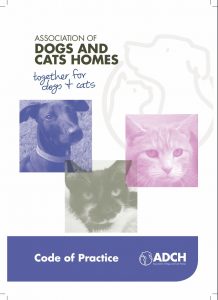 The ADCH, Association of Dogs and Cats Homes, promotes best practice in animal welfare for dogs and cats. Members are dedicated to dog and cat rescue.
The ADCH, Association of Dogs and Cats Homes, promotes best practice in animal welfare for dogs and cats. Members are dedicated to dog and cat rescue.
“There are some 16 million pet dogs and cats throughout the UK, the vast majority kept by responsible, loving owners. Regrettably however some 250,000 pets come into rescue centres each year where our members endeavour to place them in new caring homes. Whilst in the care of our members we expect all animals to receive the best possible attention including exercise, enrichment and appropriate basic training. Through the commitment and dedicated hard work of our members we hope to educate the public so that those considering a new family dog or cat will take on a rescue pet or purchase through an accredited breeder. The alternative is to support the irresponsible and unnecessary breeding of animals which simply increases the number of dogs and cats awaiting rehoming from rescue centres.”
The purposes of the Association are to:
- Develop good practice and influence others working in the rescue and/or rehoming of dogs and cats.
- Address common problems and issues.
- Explore and, where appropriate, negotiate price reductions through economies of scale.
- Exchange information and provide mutual support where practicable, which may include the movement of dogs and cats between organisations.
- Combine resources to encourage workable, welfare enhancing legislation.
- Exchange knowledge in construction and refurbishment of facilities.
- Where appropriate and agreed, represent the views of members to a wider audience.
The Code of Practice was launched in April 2014 at the ADCH Annual General Meeting and Conference. Through the promotion and implementation of the Code ADCH intends to raise standards across the animal rehoming sector and to reinforce professional credibility and confidence in ADCH members individually and collectively as ‘trusted providers’.
Code of Practice – ADCH
What is the Answer?
There is no simple answer. The utopia for volunteer based rescues such as ourselves would be that we were no longer needed on such a scale and could be there purely to support the unfortunate few whose circumstances have changed meaning they need to find their dog a new home. What about the major rescues such as the RSPCA, Blue Cross, Dogs Trust, Battersea etc.? If rescues were no longer needed on such a scale then many people employed by these large charities would be out of a job, and as we know, in some cases, some very highly paid jobs! Of course they campaign for changes and highlight the issues most prominent in the rescue world, and without them the animals would not be heard at all, and the reality is that rescues will never disappear, however, this then leads on to the question of who sits down with DEFRA and the Government when talks do take place to change laws and policies? The same people who are making a living from their position in a charity. Maybe, no definitely, there should be fairer representation on such committees for all rescues. Internet based rescues such as GSRE operate in an entirely different manner to rescue centres and therefore have a different insight into some of the issues in play. They also do not hold a financial stake in the continued need for rescues to exist.
The other major players that come to the fore are the companies that make their fortune out of the pet industry in the UK. Whilst most major players may not sell puppies in their stores, I have been told they would not want to support a change in the law in case it led to laws preventing the sale of any live animal. Stakeholders in the pet supply industry would not want to see a drop in the number of dogs in the UK as this would mean tougher competition and less profits.
The major problem for any changes to be made and be effective all come back to needing more financial resources, changes and updates in legislation, and all required at Government level.
 Interestingly this article was presented in April this year by Dog World.
Interestingly this article was presented in April this year by Dog World.
“POLICE chiefs have called for the RSPCA to no longer be responsible for prosecutions under the Animal Welfare Act. Instead they want a single, Government-funded agency to take control. At present the RSPCA prosecutes 80 per cent of cases.
The National Police Chiefs Council (NPCC) has submitted evidence to a new Environment Food and Rural Affairs enquiry into the welfare of domestic animals. It said it had some concerns about enforcement of the Act as because there is not a single agency ultimately responsible or accountable, enforcement activity was inconsistent across the country…
..NPCC spokesman Deputy Chief Constable Gareth Pritchard told DOG WORLD: “Under the Animal Welfare Act 2006 there is no one agency that is held responsible or accountable for enforcement of animal welfare. This means there are inconsistencies, but the police, local authorities and animal welfare charities do seek to work together to deal with serious cruelty to animals. “
So where do we start? The creation of a Government funded agency to take control of animal welfare issues is most certainly the starting point. This agency should be responsible for monitoring and supporting AW’s at council level, ensuring all councils are properly staffed and trained, or create a network of AW’s removing ‘policing’ and enforcement from the councils. Working alongside all major stakeholders, including the Kennel Club on breeding issues, this agency should be working to update the outdated laws by expansion and definition in relation to all points, most importantly the Animal Welfare Act 2006 by better incorporation of the Code of Practice for the Welfare of Dogs, and, the Breeding and Sale of Dogs (Welfare) Act 1999, reducing the number of litters from 5 before a breeding license is required. One litter can be classed as an accident but a second litter is deliberate! Breeders of even one litter should still have to register that litter. The agency should then be enforcing the laws and penalising where necessary at a level which will have a detrimental effect. Bad breeders, dealers, etc. will only take notice if the cash in their pocket is removed.
Whilst there are some major players fighting on the front line for a better life for the dogs (and cats), one has to consider that the RSPCA is the voice most listened to by DEFRA, and possibly the one with the most to lose should such major changes be possible. The number of people employed as inspectors and within their administration and legal teams is so vast, why would they want that to be taken away from them? However, if they worked with any new agency that came into being, then surely these employees could be the first choice for the front line rolling out a smooth start?
An area that has not been touched on is the neutering of dogs and is an area that needs to be covered. Unless you are breeding from your dog as a ‘licensed’ breeder, there is absolutely no good reason to keep a dog entire. In fact there are more benefits than people realise. Of course there would have to be certain exemptions such as some working dogs. Some councils have in place agreements with their tenants whereby if they own a dog/dogs, they must be neutered and microchipped. As it is part of the tenancy agreement, should the tenant fail to comply they can be evicted. There is no reason why all councils could not instigate these conditions and it would reduce the number of back street breeders looking to supplement their income with easy cash. Maybe breeders should become responsible for ensuring puppies sold are neutered? It could be part of their sale agreement as rescues make it part of their adoption agreement.
No responsible rescue is against good breeders and we recognise that we need quality breeders to continue the breeds but, these breeders must be working to a proper framework and should all be registered in some way. The Kennel Club already lists pedigree breeders and has an Assured Breeder Scheme (ASB) in place breeders can join subject to their criteria. The Kennel Club ASB promotes good breeding practice and aims to work together with breeders and buyers to force irresponsible breeders, or puppy farmers, out of business.
Breeders nationwide are joining to demonstrate their commitment to responsible breeding. In return, they are able to use the scheme literature and logo to promote their litters. The Kennel Club is the only organisation accredited by the United Kingdom Accreditation Service (UKAS) to certify dog breeders, under the Kennel Club ASB. This means that the Kennel Club is recognised as an impartial and competent inspector by the Government’s sole national accreditation body. This gives the puppy buying public additional confidence that Assured Breeders are committed to meeting and maintaining high standards for caring for the health and welfare of their puppies and breeding bitches, and are the best point of contact for buying a healthy, happy puppy.
Another interesting article from Dog World in April this year related to ABS members who could be exempt from licensing at council level.
“THE GOVERNMENT is considering exempting members of the Kennel Club’s Assured Breeder Scheme (ABS) from licensing requirements.
A recent DEFRA consultation into the licensing of animal establishments in England asked whether businesses affiliated to a body accredited by UKAS – which the ABS is – should be exempted.
Most people disagreed with the idea (42.5 per cent) and 31 per cent were in favour. However, the KC ran a campaign alongside DEFRA’s consultation asking members to submit responses, and the 151 generated boosted the percentage to 42. Respondents to DEFRA’s consultation thought the idea confusing, that breeders should be treated the same and that the proposal would lead to a two-tier system. And Dogs Trust said it was ‘extremely concerned’.”
ABS members could be exempt from licensing
The Dog’s Trust state, “We will continue to raise awareness on the need to educate the public on the responsible purchasing of pets, and push for this to be supported by strengthening the law surrounding dog breeding and advertising. We are calling for:
- Continued support from Government in tackling the concerns surrounding breeding and the advertising of dogs
- A review of the Pet Animals Act 1951 to consider its effectiveness in the twenty-first century culture of online sales and impulse buys
- The introduction of improved breeding conditions and practices through effective and robust license requirements.”
The free movement of dogs must be stopped. The Government are proposing some changes to PETS, which will come into effect later this year. However, it is not enough and the Dog’s Trust do not believe that it will reduce the proven abuse of the scheme. They are calling for:
- An immediate Government action plan to address these concerns, including banning puppies under the age of 6 months from entering the UK
- A cross agency database together with full training given to relevant authorities
- A crackdown on vets who falsify or supply fake pet passports within the countries that import puppies into the UK
- A fixed penalty charge for those caught illegally bringing dogs into the UK
 The EU Dog and Cat Alliance have clearly stated their position on the international rehoming of dogs and cats.
The EU Dog and Cat Alliance have clearly stated their position on the international rehoming of dogs and cats.
“Dogs and cats may be moved between EU Member States or imported from third countries for trade purposes. They may also be moved for other reasons such as movements for rehoming, participation in shows or exhibitions, holidays with their owners or relocating with their owner to another country.
Movements over country borders in this way can pose a risk to both animal and human health if measures aren’t taken to prevent diseases from being transferred between countries. Although existing EU legislation aims to minimise the risks of rabies, there are many other diseases which aren’t covered by EU legislation but which are of concern, such as leishmaniosis.
Where animals are transported in poor conditions over long periods of time, this is also a welfare concern.
Without a system for the identification and registration of dogs and cats, which is accessible across the EU, there is currently little traceability when animals are moved over borders.
We are calling for:
- EU legislation requiring the compulsory permanent identification and registration of dogs and cats on an appropriate database, which is linked to an EU database. This would allow traceability to help protect animal health and welfare, public health and improve consumer protection.
- The proper enforcement of Council Regulation (EC) No 1/2005 on the protection of animals during transport and related operations. This Regulation applies to dogs and cats which are transported in connection with an economic activity. Animals must be fit to travel and not transported in a way likely to cause them injury or undue suffering.”
The microchipping databases in the UK need to be looked at and brought into line as at present they all operate very differently, especially when it comes to updating a dog’s microchip. In some cases, it takes them longer than the 14 days leeway given if a dog is found not to be microchipped! There also needs to be the creation of an EU database to trace animals moved across borders. Microchipping is definitely the way forward to identify lost or stolen dogs and for there to be accountability leading back to a breeder. More checks should and must be done and enforcement must be followed through. If fines were instigated in the same way as a parking fine, the revenue created could be substantial to start, thus creating a further financial resource to work from.
 A register of recognised rescues should be created by the Agency, and this could be done in conjunction with the ADCH who have already put a lot of work into setting up the standards and code of practice. The public need to have the confidence to deal with a rescue and the understanding of working with a good rescue. Just as there would be a directory of registered breeders for the public to work with, there could then be a directory of registered rescues. This would eliminate the rogue rescues and the dealers, especially if there was some form of financial penalty put into place for failing to register, or not adhering to the code of practice.
A register of recognised rescues should be created by the Agency, and this could be done in conjunction with the ADCH who have already put a lot of work into setting up the standards and code of practice. The public need to have the confidence to deal with a rescue and the understanding of working with a good rescue. Just as there would be a directory of registered breeders for the public to work with, there could then be a directory of registered rescues. This would eliminate the rogue rescues and the dealers, especially if there was some form of financial penalty put into place for failing to register, or not adhering to the code of practice.
The Big Four – Did The Dogs Deserve More?
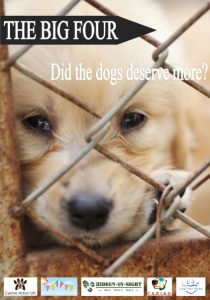 “On Tuesday, 19th April the UK’s four largest animal welfare charities sat before the EFRA Sub-Committee to present their evidence as part of the EFRA Inquiry into ‘Animal Welfare: Domestic Pets.’
“On Tuesday, 19th April the UK’s four largest animal welfare charities sat before the EFRA Sub-Committee to present their evidence as part of the EFRA Inquiry into ‘Animal Welfare: Domestic Pets.’
With a combined history of 592 years and income amounting to millions of pounds per year, evidence from Battersea Dogs and Cats Home, Blue Cross, Dogs Trust and the RSPCA was highly anticipated. All four organisations on the panel had produced extensive reports within the last 12 months on various aspects of the puppy trade, so there was a justifiable expectation that their evidence and supporting recommendations would be sound, cohesive and to the betterment of animal welfare.
Battersea Cats and Dogs Home: Established in 1860
Blue Cross: Established in 1897
Dogs Trust: Established in 1891
RSPCA: Established in 1824
The EFRA Inquiry into ‘Animal Welfare: Domestic Pets’ is an extremely important opportunity to impact positively on the lives of the UK’s domestic pets. This is an opportunity that cannot be taken lightly and all evidence givers have a duty to present EFRA with accurate evidence and workable solutions. We may never have an opportunity like this again.
Our coalition of organisations campaign for higher standards of welfare for breeding dogs in general, and in particular, for the prohibition of puppy sales via licensed third party outlets (pet shops). This is the simplest and most effective means of ensuring transparency, accountability and thus responsibility for commercial dog breeders. To this end we function as campaigners, researchers and investigators and in these roles have amassed extensive knowledge and evidence of licensed breeding and pet shop establishments.
Having reviewed the evidence submitted by ‘The Big Four’, our coalition found itself asking the question ‘Did the dogs deserve more?’. We believe the answer to be a resounding, yes.
Read our full report into the evidence submitted by ‘The Big Four’. The dogs don’t have a voice, so we believe we have a moral duty to speak for them.”
The Big Four – Did The Dogs Deserve More?
The report makes very interesting reading and illustrates how there needs to be more communication and unification between the major players! Of course all of this is just one rescue’s opinion and would involve a major investment from the Government, and with major cutbacks across all sectors, may well be ‘pie in the sky’. It needs unification working towards a common goal if we are to ever reach our utopia
It is time that we all stood up as one for the dogs in the UK and gave them a voice! Their barks go unheard when they are sitting in a pound waiting to die! We must bark for them!
This article was created in September 2016. Since then we are pleased to say there have been some updates to legislation. For current laws please click the link below.
Dog Laws – The Basics
